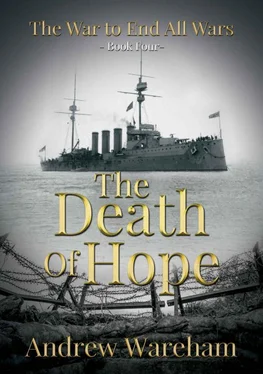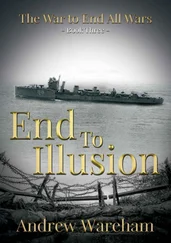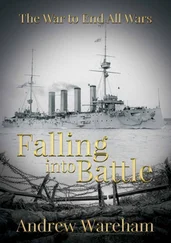“He is in the Mediterranean in command of his own destroyer, as you know. The few letters we have received suggest he is enjoying himself as captain. Ridiculous, of course – he is barely more than a schoolboy! This war has forced so many boys to become men before their time, Simon!”
“It has, sir. What will become of them when it is all over, I cannot imagine. We have an easier life in the Navy, that I am sure of. Even so, we are pushed to take responsibility undreamed of even two years ago. In October ’13 I was a sublieutenant, a very minor specimen of humanity and expecting with luck to become lieutenant in ’15 or ’16. Now, I am a lieutenant commander with a half-flotilla of my own and every prospect of stepping up in the naval world again if the war lasts another two years.”
“It will, Simon. Every rational prospect says it could last another ten. There is nothing to stop the stalemate we can see in the Trenches dragging on for a decade. Russia is collapsing and Germany will soon be able to feed herself from the steppes, making the blockade a nonsense. Kitchener sits in his office and proclaims the need for more men to go out to France while Churchill wastes resources in Turkey. The fleet sits in idleness in the Shetlands. I can see no hope of winning this war, and no likelihood of losing it. Such being the case, it can never end.”
“What of America, sir?”
“Profiting greatly from us. Quite rightly, too. We desire to buy from them. They wish to sell to us. Perfectly normal business. They would be fools to join in on either side. Mind you, there are rumours that Germany is trying to make some sort of connection with Mexico, offering them the lands America stole in the South West. They could use that threat to force America to become truly neutral.”
It seemed far-fetched. The whole war was crazy – it was possible.
“I am told that the Japanese are sending a fleet to the Mediterranean, Simon. Have you heard of that?”
No word had reached Harwich if that was so.
“Enough of gloom, Simon. Off you go with my blessing to find Alice.”
The proposal was made in form and accepted with delight, elder sister and mother joining the pair after ten minutes to express their joy and prise them apart.
“When can you wed, Simon?”
“I have a long leave now, will not get another this year in the ordinary way of things. In early ’16, I might hope.”
Alice looked hopeful.
“The war should end then, Simon. Kitchener’s New Army is to be trained and ready to go in the summer. It must end the war, all of the newspapers say so.”
“The newspapers may say that, my love. Outside of Fleet Street there is less optimism. They may be very good – the flower of English youth, I believe – but they will still be a bare quarter of a million against an estimated two million Germans in the trenches. The French have taken huge losses already and will not march in Flanders, we are told. The British Army will not win this war without a huge number of allies.”
“What of the naval war, Simon?”
Alice’s sister, Sarah, had rarely spoken in company. She was, he thought, still grieving for her fiancé, lost in the war of movement the previous year.
“None as far as the Grand Fleet is concerned. For us, the small ships, predominantly a defensive war. Above all, we must protect the Channel and the unending flow of troopships and ration carriers. Until we take our war to the German-held ports, we will be holding, not advancing. We have been successful so far in keeping the German destroyers and submarines at a distance. It needs only a single night of failure for the war to take a turn for the bad. A dozen torpedoes could cost us a division, and that would be a disaster.”
“I have been thinking of taking up nursing, Simon. A year to learn the necessary skills… It seems that my services might still be required then.”
He had nothing to say, could not encourage her if her parents were opposed. Nurses were needed and every girl with an education should be doing something for the country… Not Alice, however. She was not the practical sort, he suspected.
“When will the notice reach The Times, do you think, ma’am?”
Better to turn the conversation to the banal.
“My husband will be setting that in hand now, I much suspect, Simon. Is your Uncle Sturton aware of your intentions?”
“He has signified his happiness with the marriage, ma’am. We must make the necessary arrangements, I do not doubt.”
“A dinner for our acquaintance is all that can be convenable in wartime. No doubt the Viscount could be invited to attend.”
Simon suspected he would be a prize to be unveiled to the County, aristocracy being uncommon among their guests.
“If you can set a date, ma’am, I must be in London next week and will speak to him in person.”
Alice was dismayed.
“Oh, can you not stay for your whole leave, Simon?”
He could not – there was family business to attend to and he needed to inform his Grandfather Isaacs in person of his engagement. He had sent him a letter, courtesy demanded that he speak to him.
“I intend, if it is convenient, to remain for this week, spend much of next in London and then come back for the last weekend and few days of my leave. Will it be possible to arrange the dinner in that time, ma’am?”
Mrs Parrett was sure that it would be. She would make very certain of it.
“Will your Uncle, Viscount Perceval, be able to stay here overnight, do you think, Simon?”
It was likely, Simon assured her.
The most distinguished guest to stay at the Hall in her time as chatelaine. Mrs Parrett would ensure he was immersed in luxury. She would also be careful that the whole County would be aware of his presence.
Days of idleness and pleasure in Alice’s company and intentionally not looking at the newspapers – a complete break from the strain of taking a ship to war. He had not known just how much pressure he had been under until it came to a temporary end. He slept for twelve hours, three nights in a row, lazed in a chair or outside on a bench for those days.
Towards the end of the week he found himself awake and alert again, apologised for being such bad company.
“You were exhausted, Simon. You needed the rest. My mother is going into Ipswich today Shall we accompany her?”
The town was dull, too many of the smaller stores displaying knots of black ribbon for sons and counter jumpers who had gone off to war and would not return. The selection of goods inside the expensive places – the only ones they patronised – was almost unchanged. There was even a supply of caviar again, more costly for having crossed to Vladivostok by rail then to San Francisco or Vancouver and across the continent before taking ship a second time. Where there was the need, and the money, life’s little luxuries were available.
There was some talk of rationing. Mrs Parrett was dismissive.
“Not for the likes of us, Simon. The government knows better!”
He made no answer, seeing poverty that she evidently did not notice. There were poorly clothed women and children, some of whom were barefoot, with oilcloth shopping bags showing almost empty. A loaf of bread, a bottle of milk and little else for most.
“Prices do seem to be higher, Mrs Parrett.”
“Oh! Are they? I just put our purchases to the account. I do not look at the cost. That is cleared every month, or is it quarter? By the housekeeper, in any case.”
Alice seemed to regard this as an entirely reasonable way of life. Simon feared he might have to hold a discussion with her regarding money. He was well off; he could hardly cope with Mrs Parrett’s level of expense.
They took a light lunch at the County Hotel before making their way to a jewellers for the important business of the day, the selection of a ring.
Читать дальше












